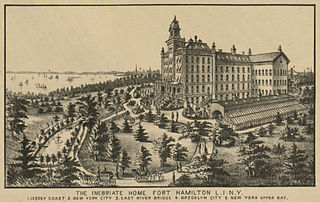
The Washingtonian movement was a 19th-century temperance fellowship founded on Thursday, April 2, 1840, by six alcoholics at Chase's Tavern on Liberty Street in Baltimore, Maryland.
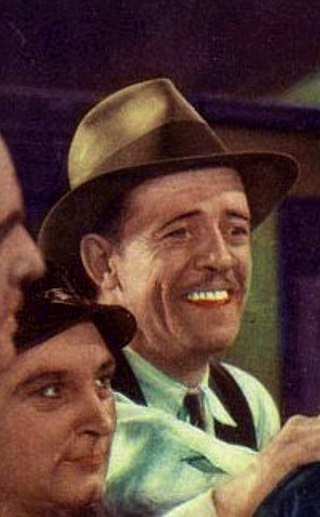
Tom London was an American actor who played frequently in B-Westerns. According to The Guinness Book of Movie Records, London is credited with appearing in the most films in the history of Hollywood, according to the 2001 book Film Facts, which says that the performer who played in the most films was "Tom London, who made his first of over 2,000 appearances in The Great Train Robbery, 1903. He used his birth name in films until 1924.
The Iceman Cometh is a play written by American playwright Eugene O'Neill in 1939. First published in 1946, the play premiered on Broadway at the Martin Beck Theatre on October 9, 1946, directed by Eddie Dowling, where it ran for 136 performances before closing on March 15, 1947. It has subsequently been adapted for the screen multiple times. The work tells the story of a number of alcoholic dead-enders who live together in a flop house above a saloon and what happens to them when the most outwardly "successful" of them embraces sobriety.
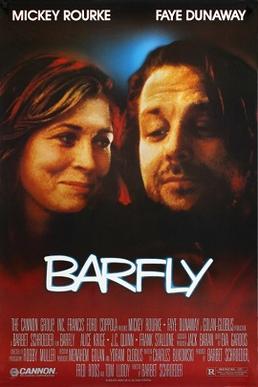
Barfly is a 1987 American black comedy film directed by Barbet Schroeder and starring Mickey Rourke and Faye Dunaway. The film is a semi-autobiography of poet/author Charles Bukowski during the time he spent drinking heavily in Los Angeles, and it presents Bukowski's alter ego Henry Chinaski. The screenplay, written by Bukowski, was commissioned by the Iranian-born Swiss film director Barbet Schroeder, and it was published in 1984, when film production was still pending.

Chester Cooper Conklin was an early American film comedian who started at Keystone Studios as one of Mack Sennett’s Keystone Cops, often paired with Mack Swain. He appeared in a series of films with Mabel Normand and worked closely with Charlie Chaplin, both in silent and sound films.

Timothy Shay Arthur — known as T. S. Arthur — was a popular 19th-century American writer. He is famously known for his temperance novel Ten Nights in a Bar-Room and What I Saw There (1854), which helped demonize alcohol in the eyes of the American public.

Hank Mann was a Russian-born and American comedian and silent screen star who was a member of the Keystone Cops, and appeared as a supporting player in many of Charlie Chaplin's films.
Ten Nights in a Barroom may refer to:
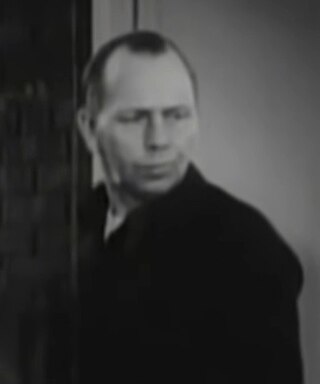
Harry Tenbrook was a Norwegian-American film actor.

William Desmond was an American actor. He appeared in more than 200 films between 1915 and 1948. He was nicknamed "The King of the Silent Serials."

Pink String and Sealing Wax is a 1945 British drama film directed by Robert Hamer and starring Mervyn Johns. It is based on a play with the same name by Roland Pertwee. It was the first feature film Robert Hamer directed on his own.
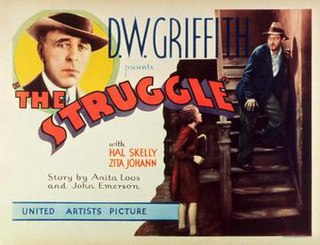
The Struggle is a 1931 American pre-Code feature film directed by D. W. Griffith based on the 1877 novel L'Assommoir by Émile Zola. It was Griffith's only full-sound film besides Abraham Lincoln (1930). After several films directed by Griffith failed at the box office, The Struggle was his last film. The film was made primarily at the Audio-Cinema studios in the Bronx, New York with some outdoor filming on the streets of the Bronx.

Martha Kane is a fictional character from the British Channel 4 soap opera Hollyoaks, played by Carli Norris. The character debuted on-screen during the episode broadcast on 18 January 2012. The character was introduced as the mother of Ash, Callum and Lacey Kane. Martha is portrayed as a feisty female and a liberal parent. Martha is an alcoholic and has been used to portray the effects the issue has on involved family members. Her addiction causes trouble and affects her youngest daughter, Lacey, following a violent altercation. Despite attempting to overcome her addiction, Martha failed to stop drinking.
Ten Nights in a Bar-room and What I Saw There is an 1854 novel written by American author Timothy Shay Arthur. The book is a temperance novel, written expressly to discourage readers from drinking alcohol. It was a commercial and popular success upon its release and was later adapted into other media.
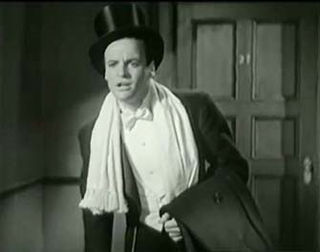
John Darrow was an American actor of the late silent and early talking film eras. He is the uncle of actress Barbara Darrow.

Unclaimed Goods is a 1918 American silent Western comedy film directed by Rollin S. Sturgeon and written by Gardner Hunting and Johnston McCulley. The film stars Vivian Martin, Harrison Ford, Casson Ferguson, George A. McDaniel, Dick La Reno, and George Kunkel. The film was released on April 14, 1918, by Paramount Pictures. It is not known whether the film currently survives.
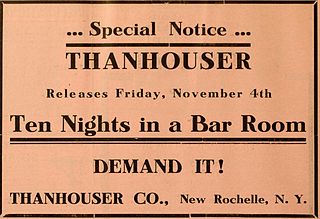
Ten Nights in a Bar Room is a 1910 American silent short drama produced by the Thanhouser Company. Adapted from the novel Ten Nights in a Bar-Room and What I Saw There by Timothy Shay Arthur, the production focuses on Joe Morgan after he has become a hopeless drunkard. Often Morgan's young daughter, Mary, comes to beg her father to return home. One day, she appears during a fight between the two men and is fatally struck by a bottle thrown by the saloon-keeper. Before Mary dies she asks her father to promise to swear off alcohol and he accepts. He is reformed and becomes successful, while the saloon-keeper is killed in a fight in an irony of fate. The film was released on November 4, 1910 and met with mixed reviews. The film is presumed lost.

The Five also known as Harlan Coben's The Five, is a British mystery thriller miniseries created by crime author Harlan Coben and written primarily by Danny Brocklehurst. Tom Cullen, O. T. Fagbenle, Lee Ingleby and Sarah Solemani star as childhood friends Mark, Danny, Slade, and Pru, who are reunited when DNA evidence left at a murder scene is revealed to be from Mark's younger brother Jesse, who disappeared twenty years earlier. The series first broadcast on 15 April 2016 on Sky1 and consists of ten episodes, with two episodes broadcast each week consecutively. Set in the fictional town of Westbridge, the series was filmed in Liverpool, Wirral, Runcorn and surrounding areas including Frodsham.

Ten Nights in a Barroom is an American film released in 1926. Directed by Roy Calnek and starring Charles Gilpin, the film had a temperance theme and an African American cast. It followed on Timothy Shay Arthur's 1854 novel Ten Nights in a Bar-Room and What I Saw There and William W. Pratt's play, as well as earlier film adaptations albeit with white casts. A man's drinking causes him to lose money, his business, and his daughter.
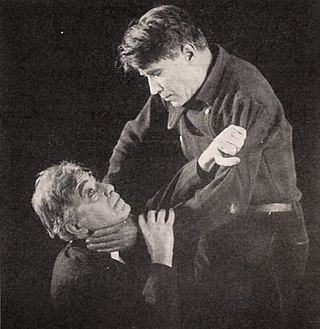
Ten Nights in a Bar Room is a 1921 melodrama film directed by Oscar Apfel. The film is based on the novel of the same name by Timothy Shay Arthur.

















